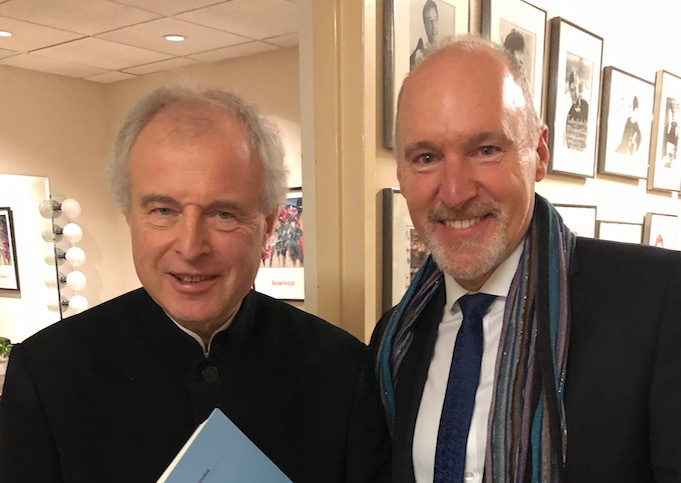JD: I want to start by thanking you for speaking out against Orbán and the Hungarian government. It was a very courageous act, and puts you in the category with Casals, Bernstein, and Masur! These great artists believed that there is no separation between art and politics.
AS: Not so courageous! But thank you.
JD: How do you see the relationship between us, as artists, and our association with beauty, and the world of politics, with its role of making society a better place to live in? Do you see a relationship? And how do they intertwine?
AS: There is an obvious relationship. In my opinion, they are inseparable. We are part of society. We always have been in one way or another. The artist always contributed to society. They were dependent on society – whether it was the royal court, or the Medici family in Florence, or the Church. Nothing could be more wrong than to say “Shut up, and do your art without looking to the right or to the left.” We would have to live in an ivory tower, unaware of all that is around us – all the injustice! We have to speak up even if we are of very little significance what we, as individuals, can do. But together, it does contribute to something larger. All of those little drops of water in the desert! Altogether something can take shape. It can give courage to people.
I also don’t look at art as just something that is beautiful. Art is also reality. Music is not always beautiful. Sometimes it’s terrifying. But still, it always gives hope.
Look at perhaps the most human of composers, Beethoven. He suffered so much, but I never find depression in his music.
JD: Anger sometimes.
AS: Anger, but no self-pity. He embraces mankind and gives a shining example of how to overcome adversity. Also never lose your sense of humor.
JD: Or another example, Bach! His was not an easy life. There were many disagreements with employers. And yet he created an unbelievable testament to joy and praise. It’s quite striking to me.
AS: Well not only economically was his life difficult, having all of those children running around would have been a huge distraction. What sort of inner peace he must have had!
Art, and music in particular, can be an example to politics and society because we talk a lot about liberty and democracy. If you take great music, certainly all notes are important, but some are more important than others. At a given point, when you play chamber music, you are often in a leading position, then a secondary position. It changes from moment to moment. You have to give up your ego for a higher goal.
This can serve as an example. And this is why I believe education is so crucial. If children don’t play an instrument, then they should all sing. If they sing in choirs, it’s a better education than sports. In sports there’s a winner and a loser. But with music, we don’t oppose each other, we strive towards a common goal.
JD: I’m very interested in your book, Music kommt aus der Stille. I’d like to know your thoughts about using music not as entertainment but as a tool, either to find one’s way into the soul of mankind or as a tool to help people.
AS: I completely oppose the idea of music as entertainment. Probably there is such a thing, but I don’t want to know about it. Yes, the listener should have a good time. But there’s much more to it than that. It should be a learning experience for both the performer and the listener. It would be good if, after a concert, people go away thinking and contemplating. “What have we heard; what have we learned? How can we translate this into other spheres of life?” Of course many composers have written divertimenti (entertainments). But quite often – such as Mozart’s divertimenti for string trio, it’s a colossal masterpiece with volumes of things to think about.
JD: Do you think the venues we have used, the concert hall, recital hall, living room, and church, might shift because of modern technology? Where is all this headed?
AS: I’m not a pessimist. A lot is being said about the crisis in Classical music. There are as many or more concerts than before. I’m worried about the quality of the actual listening, however. People come by the thousands to hear Classical music today. Compare that to the age of Bach. It’s perhaps 100,000 times more popular now than it was then. But as we improve technology and the other tools, it is imperative to use these tools in an intelligent way. So, as good as recorded music is, it’s not the real thing. People will always want to hear and see the real thing. It’s an event. It’s a one and only event each time. Each day is a different performance; we are not machines.
So the venues play an important role. We often play in huge venues, like Davies Concert Hall here. It’s wonderful for Mendelssohn’s Lobgesang, but it’s not right when you play a Schubert Impromptu. But having said that, even in a huge space you can create the illusion of intimacy.
The Church (Catholic & Lutheran) contributed tremendously to the develop of Western art. Bach’s main goal was to write for the glory of God and for the community. That’s why I consider him the greatest: because he has no ego. It’s not about himself. Even Mozart and Beethoven considered writing for God as the highest goal.
JD: It seems to me that both Mozart and Beethoven saw themselves as servants to the music. The music is foremost, and they serve that.
AS: Absolutely. And you can see it in the Mendelssohn Lobegesang that we’re doing right now. The second movement is an intimate chamber piece. And then you have the glorious sacred movements interchanging with the worldly elements. Bach did this in his cantatas and Passions – These pieces are full of secular elements and dances. Instrumental pieces go hand in hand with the sacred.
It would be very good if works like that were written again.
JD: Certainly Arvo Pärt led a whole generation in that direction.
AS: Yes, that’s true.
JD: Music being ephemeral, do you ever wonder what happens to the sound as it goes out from the instrument you’re playing, whether that be a piano or an orchestra, and reaches the audience. How is it perceived? In a way this is a ridiculous question because there is no answer. But is “what happens” a question you ever ponder?
AS: Yes. I believe that each sound we ever produce is preserved somewhere in the universe, or cosmos. I wouldn’t call myself a religious person, but I am a believer of sorts. I don’t believe in materialism. If materialism was a valid philosophy then we couldn’t explain art. Physicists can explain sound, of course. But great scientists know that, at a very high level, there is a certain poetry in science and in mathmatics.
So, for me, music-making is the imagination and the realization of making a sound. In order to make that, you must first have imagination. Then you convey that onto the instrument, coupled with the techniques one develops in order to realize our craft.
I try to listen to the beginning (and you will know this, as an organist), the duration, and the end of a sound. What happens at the end of that sound? I think it goes out into the universe, into the cosmos, and it’s there! It also comes to the individual listeners. But the individual listener interprets the sound; this is their freedom. That’s the beauty of it. We don’t have to command the listener. The listener has the ability to associate.
With all the arts, each person has his or her interpretation, what a picture or a poem reminds them of. It’s all different. But nowhere is it more abstract than in music. That’s the beauty of it.
JD: We have a special privilege, as musicians, because we are caretakers of the soul. That’s a responsibility that I feel almost every time I play. On some small level, I am helping people make a connection, even a transformation, that they might not otherwise. It’s a weighty responsibility, but a joyous responsibility.
AS: Yes! I love Indian classical music very much. They are great artists. And one of the great Indian musicians once told me: In our culture, we never play a note without Divine inspiration. It’s our responsibility.
I try to learn from that. Before you produce a note, a sound, think about that!
JD: Hazrat Inayat Khan’s book, The Music of Life, talks about how musicians in India play music based on their spiritual attainment, as opposed to their technical mastery. So, in my case, that means I wouldn’t dream of playing the Bach Passacaglia until I had some depth of life to express. It’s that concept. And I’ve always thought that was such a beautiful concept. Yes, we have to have technical mastery; but that’s not the goal.
Thank you for sharing your ideas with me, and especially for the opportunity to work together in the Concert Hall.
AS: It’s been my pleasure!

